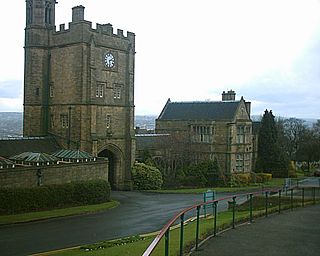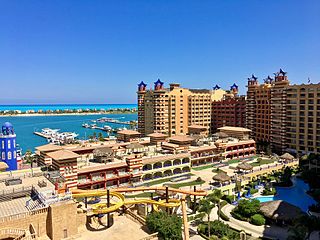
El Alamein is a town in the northern Matrouh Governorate of Egypt. Located on the Arab's Gulf, Mediterranean Sea, it lies 106 kilometres (66 mi) west of Alexandria and 300 kilometres (186 mi) northwest of Cairo. As of 2007, it had a population of 7,397 inhabitants.

Brookwood Cemetery, also known as the London Necropolis, is a burial ground in Brookwood, Surrey, England. It is the largest cemetery in the United Kingdom and one of the largest in Europe. The cemetery is listed a Grade I site in the Register of Historic Parks and Gardens.

The Kranji War Memorial is located at 9 Woodlands Road, in Kranji in northern Singapore. Dedicated to the men and women from the United Kingdom, Australia, Canada, Sri Lanka, India, Malaya, the Netherlands and New Zealand who died defending Singapore and Malaya against the invading Japanese forces during World War II, it comprises the War Graves, the Memorial Walls, the State Cemetery, and the Military Graves.

Milltown Cemetery is a large cemetery in west Belfast, Northern Ireland. It lies within the townland of Ballymurphy, between Falls Road and the M1 motorway.

Cambridge American Cemetery and Memorial is a World War II American military war grave cemetery, located between the villages of Coton and Madingley, 7 km (4.3 mi) north-west of Cambridge, England. The cemetery, dedicated in 1956, contains 3,811 American war dead and covers 30.5 acres (12.3 ha). Cambridge American Cemetery is one of 26 overseas military cemeteries administered by the American Battle Monuments Commission (ABMC).
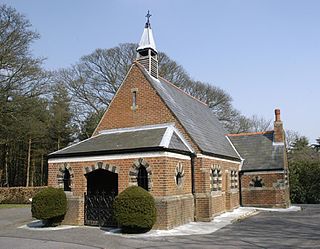
Aldershot Military Cemetery is a burial ground for military personnel, or ex-military personnel and their families, located in Aldershot Military Town, Hampshire.
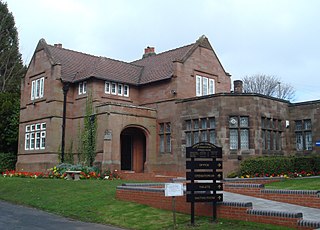
Lodge Hill Cemetery is a municipal cemetery and crematorium in Selly Oak, Birmingham, England. The cemetery was first opened by King’s Norton Rural District Council in 1895, and during the 1930s became the site of Birmingham's first municipal crematorium.

Haydarpaşa Cemetery, also known as Haidar Pasha Cemetery, Istanbul,, located in the Haydarpaşa neighborhood of Üsküdar district in the Asian part of Istanbul, Turkey, is a burial ground established initially for British military personnel who took part in the Crimean War (1854–1856). The cemetery holds also graves of Commonwealth soldiers from the two World Wars, and civilians of British nationality.

Southern Cemetery is a large municipal cemetery in Chorlton-cum-Hardy, Manchester, England, 3 miles (4.8 km) south of the city centre. It opened in 1879 and is owned and administered by Manchester City Council. It is the largest municipal cemetery in the United Kingdom and the second largest in Europe.

The Bayeux War Cemetery is the largest Second World War cemetery of Commonwealth soldiers in France, located in Bayeux, Normandy. The cemetery contains 4,648 burials, mostly of the Invasion of Normandy. Opposite this cemetery stands the Bayeux Memorial which commemorates more than 1,800 casualties of the Commonwealth forces who died in Normandy and have no known grave.

Brookwood American Cemetery and Memorial is the only American Military Cemetery of World War I in the British Isles. Located approximately 28 miles (45 km) southwest of London, Brookwood American Cemetery contains the graves of 468 American war dead, including the graves of 41 unknown servicemen, from World War I.

Welford Road Cemetery is a public cemetery in Leicester, England.
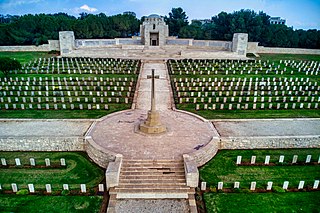
The Jerusalem War Cemetery is a British cemetery in Jerusalem for fallen servicemen of the British Commonwealth in the World War I in the Palestine campaign.

Quéant Road Cemetery is a World War I cemetery located between the villages of Buissy and Quéant in the Nord-Pas de Calais region of France. Situated on the north side of the D14 road, about three kilometres from Buissy, it contains 2,377 burials and commemorations of Commonwealth soldiers who died in the era of 1917 and 1918. The first burials were of soldiers who died in the period from September to November 1918. Following the Armistice the cemetery was enlarged to accommodate over 2,200 burials moved from surrounding battlefields and cemeteries.

The Arras Flying Services Memorial Commonwealth War Graves Commission war memorial in the Faubourg d'Amiens Cemetery, Arras, France. The memorial commemorates nearly 1,000 airmen from forces of the Commonwealth who were killed on the Western Front during World War I and who have no known grave. The memorial was designed by Edwin Lutyens, sculpted by William Reid Dick and unveiled by Hugh Trenchard, 1st Viscount Trenchard, Marshal of the Royal Air Force on 31 July 1932.
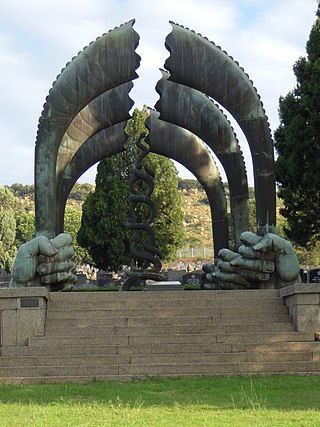
Westpark Cemetery is a large cemetery in Johannesburg, South Africa, and is the resting place of some of the country's well-known citizens. It is a non-denomination designated burial ground, and thus has Christian, Jewish, Muslim and Chinese burial areas. The Jewish section contains a Holocaust Memorial, erected in 1959.

Lowestoft Cemetery is a burial ground in the town of Lowestoft in Suffolk. It is best known for its large number of Royal Navy burials from World War I and World War II; these are maintained by the Commonwealth War Graves Commission. Thomas Crisp, who was posthumously awarded the Victoria Cross in 1917 is commemorated here on his wife's headstone. Buried here is Robert William Hook, coxswain at RNLI Lowestoft from 1853 to 1883 and who has been credited with saving more than 600 lives. The cemetery is managed by Waveney District Council.

Tredworth Road Cemetery, sometimes known as Gloucester Old Cemetery, is a cemetery in Gloucester, England, that is run by Gloucester City Council. In addition, it contains over 250 war graves maintained by the Commonwealth War Graves Commission. The cemetery chapel is a grade II listed building with Historic England.

Atherton War Cemetery is a heritage-listed cemetery at the corner of Kennedy Highway and Rockley Road, Atherton, Tablelands Region, Queensland, Australia. It was built in 1942. It was added to the Queensland Heritage Register on 19 November 2010.












